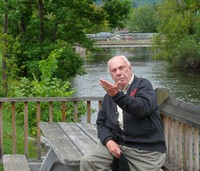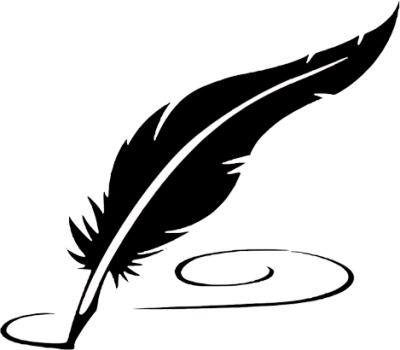Derek C. Maus
“Mastery”
If ever word there was that needed rescue
From overfoul connotation, it might well be this:
Master.
From Tom Waits’s Renfield shouting it slavishly –
“May-aaaaaasss-tuh!” –
at Gary Oldman’s draconic Dracula,
To Simon Legree’s “bad cop” juxtaposed against Augustine St.
Clare’s ostensibly “good cop”
It’s not easy to feel much comfort at being told one is in
the presence of one’s master any more.
But perhaps that’s not as it should be.
For as writers, as thinkers, as people with living hearts and minds,
we often must stand on the shoulders of giants to see over the
fences and walls that block the paths before us.
And if those shoulders are to support our often halting and fearfully
untutored weights, bearing down like unhewn logs or unchiseled
stone, then it appears to me there needs to be some power in them.
My fortunate soul has known such power
– perhaps not often, but also not never.
Some of my giants may even stand no more than five-foot-eight –
even if the New York DMV robs them of an official inch or two.
Eliot ripped off Dante and called Pound “il migglior fabbro”
as he started his journey through the waste-land
Even though my landscapes have never been as cruel as those of
Eliot’s Bavarian April and my lilacs have usually
– usually – bloomed of their own accord
I will not call him by this name, though I esteem him in
measures no less profound.
Master of strawberries, wild and tamed,
master of chanted and enchanting moccasins
master of dugouts and Greyhound buses:
You redeemed the word as verily as the
striving shoot of trillium redeems the winter.
*Header Photo, “Maurice in Namur,” Courtesy of Beatrice Machet
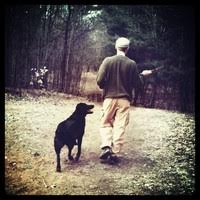 Derek C. Maus is Professor of English and Communication at SUNY Potsdam, where he has taught all manner of other people’s literary beauty and brilliance since 2001. Three days after starting his job there, he met Maurice Kenny — whose office was two doors down the hall — and quickly struck up a friendship that involved shared meals numbering into the thousands, travels through a half-dozen countries on multiple continents, spirited argument about the merits (or lack thereof) of various artists and their works, the ardent affections of numerous dogs and cats, and above all a mutual appreciation for the trilliums, cherries, homegrown tomatoes, and linden trees that help mitigate the pain of being surrounded by human ignorance. An additional tribute he has written to Maurice Kenny can be found here.
Derek C. Maus is Professor of English and Communication at SUNY Potsdam, where he has taught all manner of other people’s literary beauty and brilliance since 2001. Three days after starting his job there, he met Maurice Kenny — whose office was two doors down the hall — and quickly struck up a friendship that involved shared meals numbering into the thousands, travels through a half-dozen countries on multiple continents, spirited argument about the merits (or lack thereof) of various artists and their works, the ardent affections of numerous dogs and cats, and above all a mutual appreciation for the trilliums, cherries, homegrown tomatoes, and linden trees that help mitigate the pain of being surrounded by human ignorance. An additional tribute he has written to Maurice Kenny can be found here.
Suzanne Rancourt
Who Strings the Bow
The poem “Who strings the bow?” was written when I lived in Redford, NY and I was attending a writing workshop with Maurice at North Country Community College in Saranac Lake. The poem is a true account about my youngest son. Maurice really loved this poem which I wrote probably around 1988. My youngest son graduated from high school in June 2002 and began his undergrad studies at SUNY Potsdam. One day he mentions that he is taking a writing class with a Maurice Kenny. I gave my son a copy of the poem and asked that he please share this with Maurice as I wrote it in one of of his classes. I also asked that my son tell Maurice that he is the boy in the poem. Maurice took my son under his wing and really helped him out. Maurice was like that.
he pulls two chairs to the table.
lunch time, the sky
is still grey. a steady garden rain hangs in the pines
before it is gravity-sucked into the earth.
everyone must be fed
and the plush nose of Blackie
the velour puppy
is placed lovingly inside
a Raggedy Ann + Andy lunch box
her thermos
a 3-D viewmaster, filled
with fluid glimpses of Sesame Street.
he is five, my son, and says “I love you, Mom,
but I can’t tell you this” and raises
his flapping-Raven-wing-eyebrows
four times. he pats
the pseudo-ravioli with a clean spoon
swirls the red sauce and spiraling cheese
“Mom, is it possible
to be a bow and an arrow
at the same time?”
Suzanne Rancourt is this issue’s featured writer.
Kenny at Saranac Lake. Courtesy of Phil Gallos.
Wendy Rose
Leaving Port Authority for Akwesasne
New York City, 1985
I saw a mesa
between two buildings,
a row of tall
narrow houses,
bare as the desert I know,
the roofs appearing
in clumps like greasewood.
O Wendy, he said
looking at his fingernails,
that’s Weehawken.
One way or another
we’ll get somewhere soon
for I have seen crows
dance on Manhatttan snow,
a hawk on Henry Street,
smoke plumes from the lips
of street kids,
mesas along the Hudson.
I am getting ready.
What the Mohawk Made the Hopi Say
Somewhere in the Adirondacks, January 1985
Unaccustomed to breath
frozen so still
as to crackle
from nose to lip,
I search the birches
for a squirrel’s tail jerk,
the roadside pond
for quail or swan.
Or is this that famous sleep
they speak of with fever in the east
or up in the mountains
when the words just yawn
and settle on their hands?
Tell me again
I have no winter at home
and the tongues that lap
against my bones
bear no leaves.
Bless this tongue
in your special way,
make brittle the spit
and faceted the tear,
make diamonds
from turquoise,
crystal light
to illumine your ice.
I finally agree
turning into a rock
that these are mountains
noble as any
and all of Arizona
must wait
for spring thaw.
Poems from What the Mohawk Made the Hopi Say, a collaboration between Maurice Kenny and the Wendy Rose. Used with permission of Wendy Rose.
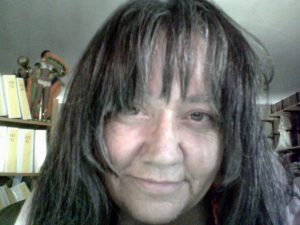 Wendy Rose is of Hopi, Miwok, and European descent. A writer and poet, she is the author of thirteen poetry collections , including Academic Squaw: Reports to the World from the Ivory Tower (1977); What Happened When the Hopi Hit New York (1982); The Halfbreed Chronicles and Other Poems (1985); Lost Copper (1980), which was nominated for a Pulitzer Prize; and Bone Dance: New and Selected Poems 1965–1992 (1994). Her poetry has been in over 150 anthologies. In addition to poetry, Rose writes nonfiction, often addressing issues of appropriation of Native American culture, including “whiteshamanism,” the misuse of the shaman identity by white writers.
Wendy Rose is of Hopi, Miwok, and European descent. A writer and poet, she is the author of thirteen poetry collections , including Academic Squaw: Reports to the World from the Ivory Tower (1977); What Happened When the Hopi Hit New York (1982); The Halfbreed Chronicles and Other Poems (1985); Lost Copper (1980), which was nominated for a Pulitzer Prize; and Bone Dance: New and Selected Poems 1965–1992 (1994). Her poetry has been in over 150 anthologies. In addition to poetry, Rose writes nonfiction, often addressing issues of appropriation of Native American culture, including “whiteshamanism,” the misuse of the shaman identity by white writers.
Alan Steinberg
When the Coyote Howls
I won’t know where or when
for now there is silence
in the empty air
a grey stillness
that swallows the sun
like dry earth
swallows the rain
But it will be at night
under a yellow moon
hung like a pendant
on a chain of stars
Thin and gaunt
it will lift its head
in the barren field
and with a voice
ripe with hunger
make the darkness shudder
and all the silent
living things
cry out in blood-red wonder
He Sang for Us All
In a deep voice
as if out of a cave
where all the joys
and sorrows
had been laid to rest
like the bones
of the long lost dead
He sang for all of them
the natives of every
time and place
sparrow and hawk
lion and lamb
Custer and Sioux
fathers and mothers
with dreams
and rifles and bos
This is life
he sang
one hand open
one hand clenched
in a fist
eagle high
on a mountain
snail in a reef
And every lover
he sang at the end
waving goodbye
with tears
and a grin
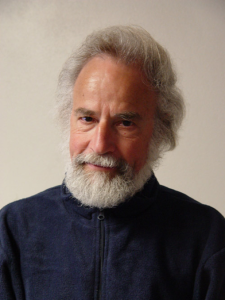 Alan Steinberg works at SUNY Potsdam. He has published fiction (Cry of the Leopard, St. Martin’s Press), poetry (Fathering, Sarasota Poetry Press), and drama (The Road to Corinth, Players Press).
Alan Steinberg works at SUNY Potsdam. He has published fiction (Cry of the Leopard, St. Martin’s Press), poetry (Fathering, Sarasota Poetry Press), and drama (The Road to Corinth, Players Press).

